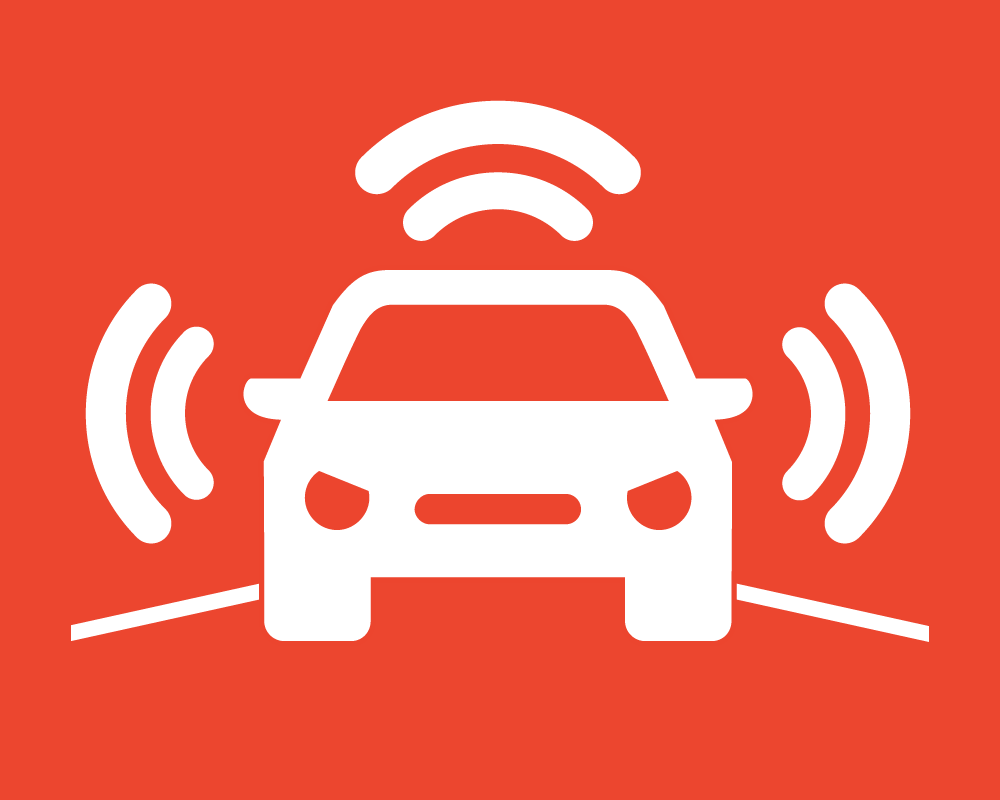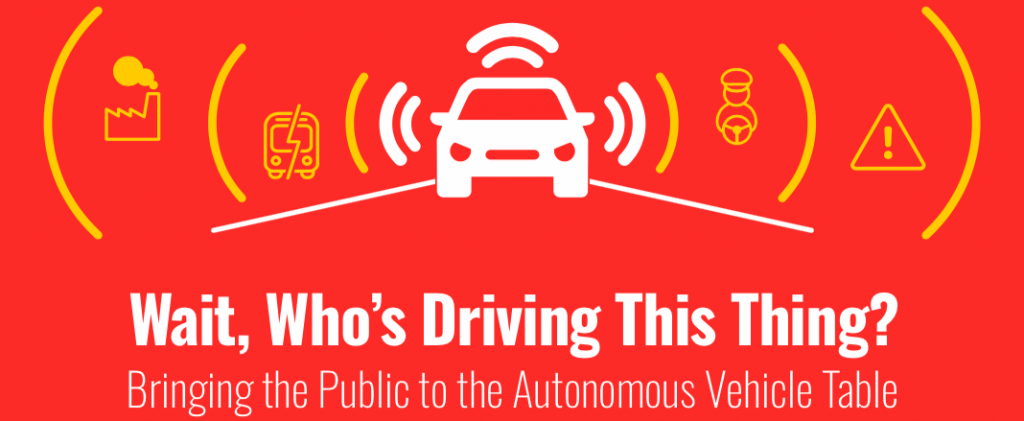
In the three years since driverless vehicles have been tested in real-life on Pittsburgh streets, the City has not hosted a single opportunity for residents to learn more about the technology’s impacts or decide if unproven AV solutions are worthy of public investment. Yet, the City of Pittsburgh has moved forward with earmarking millions of public dollars to facilitate an experimental deployment of a driverless shuttle in Hazlewood, the Run, Panther Hollow, Oakland.
Now more then ever, the public must be included in the conversation about autonomous vehicle investment. They deserve the public forum and resources to evaluate the impacts that AV will have on our communities, and determine if this is a future worth investing public dollars in.
It is time that the public is brought to the autonomous vehicle table.
PPT has spent the last 10 months working with researchers at the University of Pittsburgh to examine what the downstream effects of Autonomous Vehicles will be on our jobs, our environment, public safety, data privacy, and access to equitable public transit.
We, the public, need to have the space to examine at all of the associated impacts that new technology will bring to society in order to determine whether our public dollars should be used to facilitate the outcome.
“Wait Who’s Driving This Thing?” is PPT’s review of what the current literature and research are saying. It is a critical perspective to include as residents in Pittsburgh and across the country deal with pressures of new technology and call for a seat at the table where decisions about public investment are being made.
See a Copy of the Full Paper Here
And see the Paper’s 1-page summary here, or check below for the document’s text.
Reach out to us with questions, comments, or if you’d like to get involved with the campaign.
Wait, Who’s Driving This Thing?: Bringing the Public to the Autonomous Vehicle Table

Pittsburghers for Public Transit (PPT) is a grassroots organization of transit riders and workers who advocate for mobility as a human right.
Every day, we see autonomous vehicles (AV) drive down the street in front of our office, and we read stories in our local papers about their deployment in our neighborhoods. Five companies have begun test-driving operations in our city over the past three years, and tens of millions of taxpayer dollars have been earmarked to support their deployment. Yet, in that time, our local government has not hosted a single conversation about how our communities will be affected by AV, nor held any public discussion about why public resources should be allocated to facilitating this technology over other inarguable mobility and pedestrian safety interventions.
We at PPT believe that we are long overdue for a public discussion of the impacts of Autonomous Vehicles. This is a conversation that should begin by examining our shared values and considering whether AV are truly the best way to address our collective needs.
We have an environmental crisis, a safety crisis, a jobs and mobility crisis that is happening now, and the impacts are irreversible. To prevent the worst outcomes of climate change, we need to dramatically reduce our vehicle emissions and change our land use patterns. To stem the rise in pedestrian and cyclist deaths that is happening in cities across the country, we need to prioritize traffic calming and people-centered design. To put an end to inequality in our country, we need to commit to providing high-quality, affordable, accessible transportation for all—as well as good family-supporting union jobs for folks to get to. Above all, we must consider the effect of eliminating driving jobs, because displacing workers is the most direct consequence of this technology.
None of the impacts of AV technology will happen in isolation, so in order to have a meaningful conversation, the public must be given the tools to weigh them as a whole. New technology, for whose benefit? At whose expense?
After our literature review, it has become apparent that any proposed benefits of AV to mobility, safety, and the environment will be realized far in the future under a very specific, impractical framework. Absent that framework, the impacts of AV will likely be harmful. As a society, we cannot wait 30 or 40 years for AV benefits to be realized. Nor do we have the luxury of simply hoping for the best outcomes when it is far more likely that AV will exacerbate existing problems.
In this time of multiple, pressing needs, we do not have the pub- lic resources to finance such uncertainty. Autonomous vehicle companies will continue to make rosy, unfounded claims in or- der to sell their products for profit. But our collective resources are finite, and with every decision to invest in supporting AV de- velopment and deployment, we miss opportunities to put our money and attention on inarguable improvements—including more public transit service; better sidewalks and dedicated bike and bus lanes; and good technology, like vehicle to traffic signal communications and electric vehicle charging infrastructure.
We offer a summary of our upcoming literature review paper below as a starting point for the public to evaluate the claims of autonomous vehicle companies, and to call for a truly open discussion of what we want “progress” to look like.
Find PPT’s complete AV literature review paper at:
www.pittsburghforpublictransit.org/av
Impact on Jobs

AV will affect about 10 million jobs where driving is a significant component of the work, and directly threaten between 3.8-4.5 million jobs where driving is the primary activity.
Eliminating bus operator positions will disproportionately affect women and people of color, and these jobs have been important for social and economic mobility. Driving jobs are primarily occupied by workers late in their careers, without college degrees. Just transitions are very unlikely, given these demographics, and there are no serious plans being advanced to support displaced transportation workers.
Impact on Public Transit and Mobility

AV is likely to diminish public transit use, which would create a vicious cycle of lower fare revenues and cut bus routes.
Any loss of services will disproportionately harm low-income communities and communities of color. Moreover, older adults and riders with disabilities rely on bus and paratransit drivers to access transit, so automating buses will reduce their access to basic needs.
.
Environmental Impacts

AV will only lead to positive environmental impacts under specific conditions and decades down the road.
In the absence of regulations, public infrastructure investments, and radical social behavioral changes, AV will likely be environmentally destructive. Transportation emissions are now the single-largest carbon producing sector of the U.S. economy. We can’t afford to wait decades in the hopes that AV will have a positive impact, particularly given that there are clear green policy solutions that would reduce our carbon footprint now.
Bicyclist & Pedestrian Safety Impacts

The safety benefits of AV have not been sufficiently proven, and there are non-autonomous vehicle technologies that could achieve the intended safety benefits.
No industry standards exist for evaluating AV as a safety solution, and current data indicate that AV crash more frequently than vehicles with human drivers. Requiring new cars to install car-to-car or car-to-infrastructure (like traffic light) communications technology would significantly improve safety with technology that is currently available. Reducing speed limits, installing protected bike/pedestrian infrastructure and getting more people on buses are proven ways to reduce pedestrian and driver fatalities.
Impacts on Privacy

Passenger routing and destination data can not only be compromised but also sold and hacked, which raises serious questions around user privacy, data ownership and safety.
Find PPT’s complete AV literature review paper at
www.pittsburghforpublictransit.org/AV
And join PPT at these upcoming events as we bring the public to the Autonomous Vehicle Table